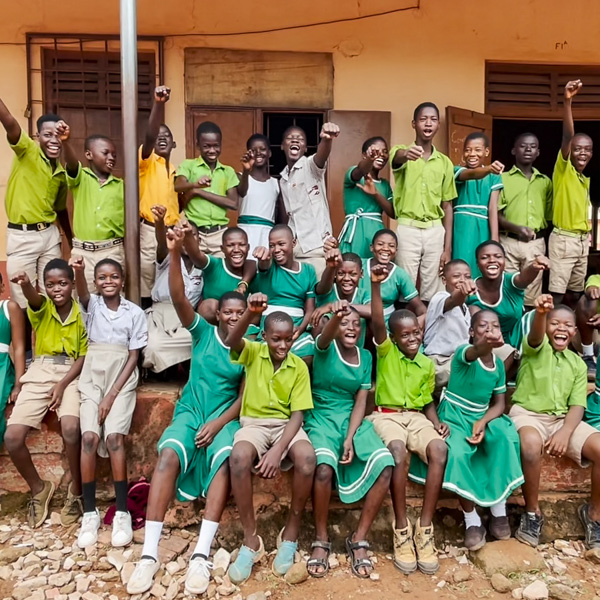Hope Education Project: Module 4 Delivery Update
This week, we introduced students to Module 4 of our human trafficking education pilot: a powerful shift from classroom learning to creating and learning on their feet. The focus of this module was participatory theatre, giving students the opportunity to co-create short plays in Dagbani based on trafficking scenarios discussed throughout the schools program.
Module 4 is designed as a rehearsal space for real-life resistance, putting key topics from Modules 1, 2 and 3 into practice. We selected students to work in three small groups and gave them very basic scripts. After running through the outline of each play with the groups, we then instructed them to adapt the material, develop characters, and practise performing their own versions of the stories.
Learning Through Drama: Embodying the Issues
Each school received three simplified scripts, representing relatable trafficking risks:
- A girl recruited for domestic labour under the promise of education
- A boy pressured by a friend to join a fishing crew in exchange for a phone
- A young woman groomed online by a man posing as a recruiter
Students were encouraged to interpret the scripts loosely, build in dialogue and to improvise freely whilst sticking with the core messages of each play. This gave them the opportunity to create plays that reflected their own voices, understanding and community context.

Rehearsal Energy and Group Dynamics
The classrooms were full of energy and creativity. Students took ownership of their plays with surprising confidence and again we were amazed by the Darrul Haddis JHS, the most deprived of the three pilot schools. In some groups the most vocal student in previous modules became the trafficker. With some encouragement from the facilitators, the quietest students really found their voice acting in the drama..
By stepping into the roles of victims, bystanders, and traffickers, students developed empathy and deeper insight into the social dynamics of trafficking. They also practised skills like assertive refusal, support-seeking behaviour and the reinforcement of the Three Trusted Adults strategy.
“The best part was acting like we were in the situation and learning how to say no,” one student shared.
What’s Next?
In Module 5, students will perform their plays in front of their peers at school. This next stage has already sparked a level of ownership and pride in the Hope Education Project for the students. Even those not acting have been fully engaged, offering ideas, cheering on their classmates and laughing together during rehearsals.

We have also seen students begin to grow in confidence and maturity, particularly those who are often quiet or disengaged in traditional lessons. The public sharing of their work is designed not only to celebrate the students’ three-week journey through the program, but also to spread the key messages of the HEP curriculum more widely across the school.
Importantly, this creative approach has provided a space for students who don’t learn best through conventional classroom methods to engage more fully. By acting out the learnings of the HEP program through drama, these learners have found their voice, some even becoming the most animated, expressive and collaborative members of their groups.
Already, we are seeing students step into the role of HEP ambassadors — proving that young people are not just passive learners, but active participants in preventing trafficking. Whether through performance, conversation, or sharing what they’ve learned at home, these students are carrying the message forward into their communities.
Closing Reflections
Module 4 has brought a wave of student leadership, laughter, and serious thought. Watching students turn stories into action has shown us they are processing the material and how powerful theatre can be as a learning tool.
As we move into Module 5, we carry forward the joy, collaboration and enthusiasm witnessed in the rehearsals. These students are not just learning to say no they’re learning to say it together – “Be smart! Be strong! Say no when things feel wrong!”




